 Int'l Snow Sculpture Art Expo in Harbin
Int'l Snow Sculpture Art Expo in Harbin Sichuan money wall for dividend payment
Sichuan money wall for dividend payment Li Na crashes Belinda Bencic in 2nd round at Australian Open
Li Na crashes Belinda Bencic in 2nd round at Australian Open
 Shocking moments when PLA's weapons open fire
Shocking moments when PLA's weapons open fire Famous Lanzhou beef noodles
Famous Lanzhou beef noodles Armed Police hold anti-terrorism drill in SE China's Xiamen
Armed Police hold anti-terrorism drill in SE China's Xiamen Harbin Int'l Ice and Snow Festival opens
Harbin Int'l Ice and Snow Festival opens 'Jin' named the word of the year by cross-strait netizens
'Jin' named the word of the year by cross-strait netizens Chinese scientific expedition goes to build new Antarctica station
Chinese scientific expedition goes to build new Antarctica station
BEIJING, Jan. 21 -- After countless hours being bounced and shaken on dilapidated roads around India, Xu Huadong finds the country "interesting."
"There is a huge gap between the rich and poor, but most people seem happy regardless of their wealth," says the chairman of Chinese machine and generator manufacturer Power HF.
"They also have a very good habit of saving. If some thing is wrong, they like to repair it, and will repair it many times. This provides a good opportunity for maintenance services."
Power HF, based in Weifang City, east China's Shandong Province, has exported 38,500 engines to India for use in telecom base stations across the country. If those base stations break down, more than 100 million Indian mobile users will be affected.
The firm has also set up a network of 174 service stations employing more than 1,500 local people across India to provide 24-hour maintenance services.
Founded in 1920, it has developed into one of the leading manufacturers of the off-highway diesel engines in China.
Its business in India started in 2007, when the Reliance Group, one of the top three telecom companies in India, ordered the engines.
In 2005, China's engine and generator industry saw a trend of excess production capacity as a result of massive investment at a time when Power HF was seeking opportunities overseas.
Like many other Chinese manufacturers, most of its business then was limited to exporting. The big order from India prompted a rethink.
"Buyers of complicated products like engines must need after-sales service. Most Chinese enterprises still depend on exporting products to make money, but international experience tells us that service is the source of more profit," says Xu.
Already well traveled, Xu conducted a thorough market investigation before deciding to open a service business in India.
The poor roads in India meant it often took more than seven hours to drive 200 kilometers. In some places, workers had travel on foot to repair the engines. Plus, India had a very complicated language system with more than 1,600 languages and dialects and foreign companies had no preferential policies.
But these conditions also offered opportunities. The backward infrastructure needed development. The population of 1.2 billion was a huge market. And English was an official language in the polyglot nation.
More importantly, laws to protect intellectual property rights were strictly enforced.
After finally deciding to open a branch in India, Xu spent about a year selecting management personnel.
"We didn't send any Chinese, because we needed personnel who spoke fluent English and had a deep understanding of India and the technology. It's too hard to find such people in China," says Xu.
Through introductions by friends, Xu interviewed many Indian candidates. "But I had an intuition that the Indian personnel had some doubts about our Chinese enterprise."
The Indian prospects were invited to China. After seeing the country's development and the modern enterprise, they were confident about working for Power HF.
The Indian market demands respect for the culture. "Indians value family. Whenever an Indian employee has a birthday, wedding, anniversary or illness, they ask for a leave. If there is contradiction between the needs of the employees and the company, we must be patient and respect the choice of the employees, because it's their culture," Xu says.
Competing with about five local rivals, the Chinese firm tries to win with high quality, timely and relatively cheap services.
However, with the appreciation of the RMB, Chinese companies are under pressure abroad.
Xu says the Indian rupee devalued about 20 percent at one stage in 2013, while the RMB appreciated 5 percent, eroding 25 percent of the gross profit margin.
"We are forced to improve management efficiency and lower operation costs. But there is a limit. Our price advantage is diminishing, and we are considering opening production plants globally," Xu says.
The Indian market now comprises more than 30 percent of the total revenue of Power HF, which has bigger plans.
"Currently we mainly provide maintenance services for the engines of the telecom base stations. In future, we hope to offer maintenance of air-conditioners, antennas and other equipment at the stations, based on our established network," says Xu.
He also wants to help other Chinese enterprises expand abroad. "The only way for Chinese equipment manufacturers to deal with the problem of excess production capacity is to go abroad," he says.p "With our network and team in India, we can be sales and service agents of Chinese manufacturers of engineering and agriculture machinery, since the engine is the basis of their products," Xu says.
The firm is eying other countries and regions, with Africa as the next key market.
"We want to copy the successful model in India, but adjustments must be made according to the situation in different countries," Xu says.
When Power HF entered India, the enterprise redesigned its products according to the hot and humid environment. Since India has stricter noise restrictions, it also adjusted their engines to reduce noise.
"Now we are entering Egypt and we must take the heat, wind, sand and dust into consideration," says Xu, adding skilled workers were harder to find in Egypt than in India, so training maintenance workers will be given priority.
"The quality of Chinese machinery is already world level. But Chinese machinery manufacturers must focus on service if they want to go abroad," Xu says.
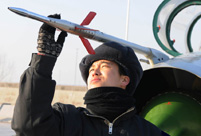 Su-30 fighter formation taking off for training
Su-30 fighter formation taking off for training 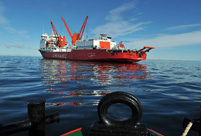 Xuelong carries on mission after breaking from floes
Xuelong carries on mission after breaking from floes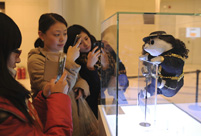 Charity exhibition raises money for panda protection
Charity exhibition raises money for panda protection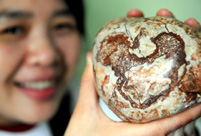 'Map of China' on the stone
'Map of China' on the stone 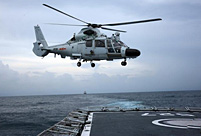 Chinese naval escort taskforce repels 4 suspicious vessels
Chinese naval escort taskforce repels 4 suspicious vessels World's weekly photos (1.6-1.12)
World's weekly photos (1.6-1.12) Li Na crashes Belinda Bencic in 2nd round at Australian Open
Li Na crashes Belinda Bencic in 2nd round at Australian Open Weekly sports photos
Weekly sports photos China's national pole dancing to play 'The Butterfly Love'
China's national pole dancing to play 'The Butterfly Love'  The never-ending Silk Road
The never-ending Silk Road  Spring Festival travel rush: One window, one world
Spring Festival travel rush: One window, one world Int'l Snow Sculpture Art Expo in Harbin
Int'l Snow Sculpture Art Expo in Harbin China photographs internal structure of water molecule
China photographs internal structure of water molecule 'Predator' makes proposal to girlfriend
'Predator' makes proposal to girlfriend Thousands of fish frozen on Norway sea
Thousands of fish frozen on Norway seaDay|Week|Month